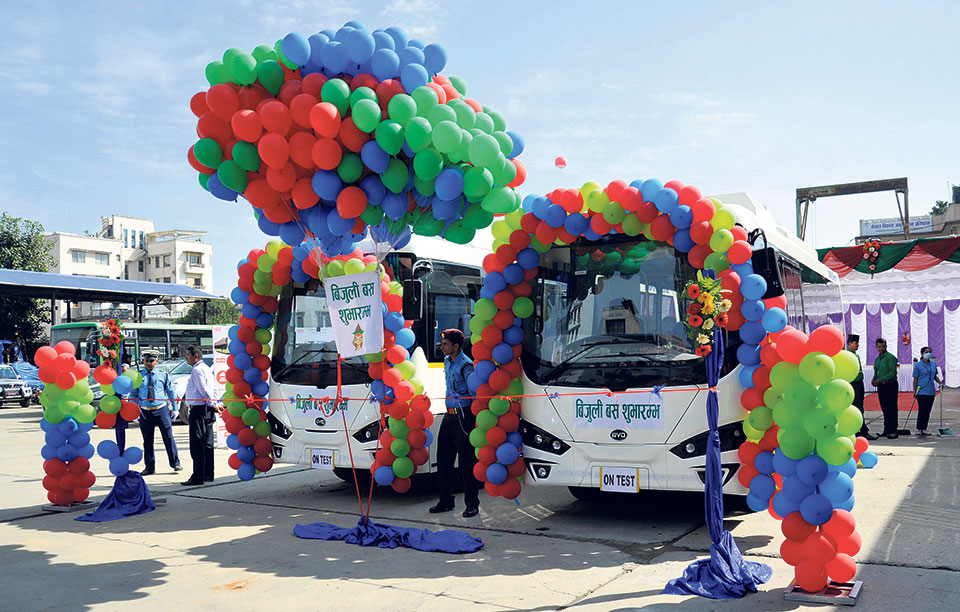
OR

Prime Minister KP Sharma Oli inaugurated Sajha Yatayat’s electric bus in Lalitpur on Tuesday. This is encouraging, and the PM has vowed to make 20 percent of vehicles plying the Nepali roads electric by 2020. While this is a tall order, a lot needs to happen before such an announcement is made real. Nepal government only levies one percent customs for electric vehicles for public use and 10 percent for private electric vehicles. However, this has not been effective as the cost of electric vehicles is still high.
Our government is pretty good at making grand announcements. But they are rarely followed up by required policy and regulatory frameworks. Proper infrastructure needs to be in place before we can aspire for 20 percent electric vehicles on our roads. We need proper charging stations, reliable power supplies and an eco-system to recycle batteries for electric vehicles. Without these in place, our envisioned electric future will only be a sweet dream. Going electric is also a matter of national security. We import petroleum products worth more than $1.4 billion annually from India, a major factor in ballooning trade deficit. Hard earned dollars by Nepalis working in the Middle East and elsewhere is spent on buying fuel, and polluting our environment. Imagine saving $1.4 billion and investing that money in education, health and other vital infrastructures needed to jumpstart our economy. Moreover, as we begin to self-rely on electric power, we also need to increase our consumption capacity. Electric power is clean and reliable, reducing our impact on climate change by burning fuels.
Countries and cities around the world have announced to phase out combustion engine vehicles from their roads. The Indian government plans to have at least 15 percent electric vehicles in the next five years. The German government has announced plans to have one million electric cars on its roads by 2020. Many car manufacturing companies have announced to stop producing combustible engine cars in the near future. These all point to one direction: the future is electric. We, as a country, should not hesitate to embrace the future. We urge the government to formulate policies so that it encourages the import of electric vehicles, and not combustible engine vehicles. Only grand announcements in public programs won’t be enough to carry out the ambitious goal of having 20 percent electric vehicles in a year. Let us work earnestly to switch to electric for the good of our mother earth, our country, our health and wellbeing.
You May Like This

KMC focusing on operation of electric vehicles
KATHMANDU, May 23: The Kathmandu Metropolitan City (KMC) is to operate electric vehicles in its bid to reduce air pollution... Read More...

“We have enough electricity to drive EV, why should we use LPG?,” asks PM Deuba
KATHMANDU, Nov 16: Prime Minister Sher Bahadur Deuba has said that the government will provide incentives for the operation of... Read More...

Vehicle Ban in Thamel draws Mixed Reaction
One actually realizes the pleasant change that occurred only after personally visiting Thamel. Cleanliness activities have started in the area,... Read More...




Just In
- Fixing a win by outlawing dissent damages democracy
- MoHP cautions docs working in govt hospitals not to work in private ones
- Over 400,000 tourists visited Mustang by road last year
- 19 hydropower projects to be showcased at investment summit
- Global oil and gold prices surge as Israel retaliates against Iran
- Sajha Yatayat cancels CEO appointment process for lack of candidates
- Govt padlocks Nepal Scouts’ property illegally occupied by NC lawmaker Deepak Khadka
- FWEAN meets with President Paudel to solicit support for women entrepreneurship







_20220508065243.jpg)





Leave A Comment